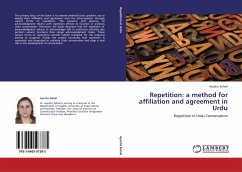The primary focus of the book is to present methods Urdu speakers use to display their affiliation and agreement with the other-speaker through variant forms of repetitions. The presence and absence of acknowledgment tokens with repetition effects its function in ordinary Urdu conversation. Moreover, the book describes that the repetition of acknowledgment tokens to acknowledge talk in multi-turn activities also perform variant functions than single acknowledgment token. These variant forms of repetitions provide helpful feedback for the ongoing activity to progress. Finally, the project concludes that repetition is systematic and organized in ordinary Urdu conversation and plays a vital role in the development of conversation.
Bitte wählen Sie Ihr Anliegen aus.
Rechnungen
Retourenschein anfordern
Bestellstatus
Storno








